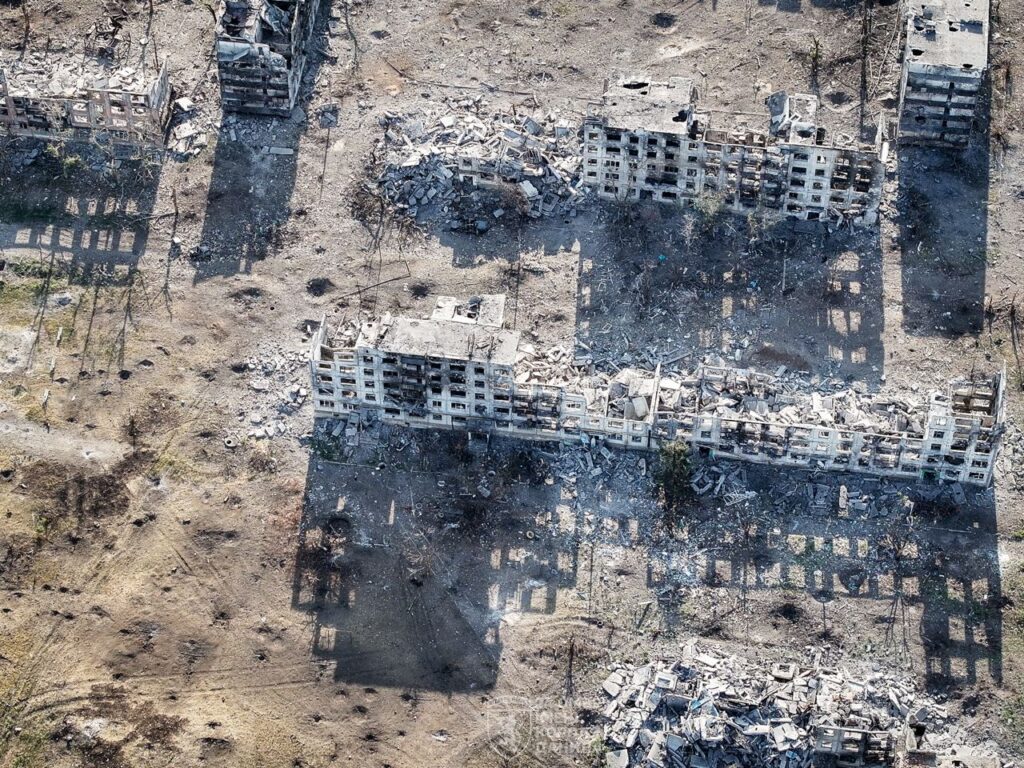Despite extensive efforts to confront the legacy of European colonialism, the West has a glaring blind spot: the failure to recognize Russia as Europe's last remaining colonial empire.
The scale of this overlooked colonial enterprise is staggering, with about 20 subjugated peoples living under colonial rule within Russia's borders. But Russia's colonial ambitions don't stop there; adhering to the familiar imperial logic of expansion, it persistently attempts to extend its reach by systematically attacking its neighbors.
This colonialism extends beyond territorial control, aiming to eliminate and replace conquered peoples with Russians. At the 2024 Kyiv Arsenal Book Fair, Kazakh-Swiss historian Botakoz Kassymbekova argued that Russian colonialism differs fundamentally from historical Western imperialism. While Western powers sought economic exploitation, Russia pursues cultural erasure and population replacement.
Kassymbekova's perspective reframes events like the annexation of Crimea and the war in Ukraine as part of a centuries-old Russian colonial pattern.
Euromaidan Press has delved into Kassymbekova's arguments, which challenge us to reconsider Russia's actions and the West's response.

The difference between colonialism and imperialism
Russian colonialism differs fundamentally from Western imperialism, argues Botakoz Kassymbekova. To understand this distinction, it's crucial to first differentiate between imperialism and colonialism:
- Imperialism: A nation interfering in other countries' affairs for its interests.
- Colonialism: Sending governors to directly rule conquered territories ("men on the spot.")
While many nations pursue their interests globally, Russia remains the sole major colonial power today, directly controlling nearly 20 ethnic groups within its borders (e.g., Tatars, Bashkirs, Buryats) and attempting to occupy neighboring countries like Georgia, Belarus, Moldova, and Ukraine.
"Colonialism involves sending your own people to rule in place, not merely interfering in other nations' affairs," Kassymbekova emphasizes.
This practice aims not just to exploit conquered peoples but to eliminate them and expand Russian ethnic presence. This distinguishes contemporary Russian colonialism from claims of Western "colonialism," which largely ended decades ago.

Ukrainians resist "Russianness" and colonial hierarchy altogether
Kassymbekova challenges a common misconception about Russian colonialism in Ukraine. Many argue it isn't true colonialism because, unlike in Western colonies where colonizers viewed the colonized as "others," Russians claim "Ukrainians are Russians." However, the historian asserts this is a superficial misunderstanding.
To illustrate her point, Kassymbekova uses the example of the Buryats, an ethnic group within Russia. In 2022, Ukrainians were puzzled by Buryat soldiers fighting in Ukraine who identified as Russian despite their distinct ethnic appearance. Buryats, being of Mongolic descent, typically have East Asian features that contrast visibly with the European appearance of ethnic Russians. Kassymbekova explains that this phenomenon is rooted in the process of assimilation, which is inherently hierarchical.

"Russianness is not simply an ethnicity or nationality. It is a status category that is expressed in the ability to dominate others in the empire," she states.
This concept of Russianness as an elevated status works differently for various groups:
- For Buryats: Identifying as Russian offers a path to a higher status within the empire despite clear ethnic and physical differences.
- For Ukrainians: Russianness holds no such appeal, as it doesn't represent an elevated status.
Kassymbekova succinctly summarizes the distinction: "Buryats are colonized, and Ukrainians are free. So, that's the different stories."
Claiming land is behind Russian colonial expansion
Kassymbekova employs Patrick Wolfe's theory to delineate two distinct types of colonialism, which helps explain Russia's approach:
- Exploitative colonialism: Typical of overseas European empires, it focuses on labor exploitation, emphasizes differences between colonizers and colonized
“If you are interested in the labor of other people, then of course they are “the others”“ because they should not be equal to you. You put them as primitives that need to be civilized,” the scholar explains.
- Settler/land colonialism (Russia's model): Focused on territorial control, assimilation, and cultural elimination.
"In settler colonialism, you are interested in the territory, so the logic is very different." This is the logic of assimilation and cultural elimination," Kassymbekova explains.
She argues that Russia's claim that "Ukrainians are us, Russians" is a classic settler colonial tactic. This approach serves specific purposes: to deny the existence of a distinct Ukrainian identity and to justify territorial expansion.
“It denies the existence of conquered peoples so they wouldn’t claim their land back. And this is the model of how Russia managed to conquer so much land in the past and how it attempts to expand today,” she claims.

How Russia became the world's largest country
To further illuminate Russia's colonial practices, Kassymbekova draws a parallel with American colonization, using historian Patrick Wolfe's framework to illustrate both types of colonialism.
In the American South, the "one-drop rule" classified anyone with any Black ancestry as Black, maintaining racial segregation and ensuring a steady labor supply for plantations. This exemplifies exploitative colonialism, focused on controlling a workforce.
“You “other” these people because the more slaves, the better,” Kassymbekova explains.

Conversely, the treatment of Native Americans followed a settler colonial model. Children of Native American and white marriages were often classified as white, encouraging assimilation. This approach aimed to weaken Native Americans' claims to their ancestral lands, as the colonizers' primary interest was in acquiring territory.
“You assimilate them so they don’t claim their land back,” she says.
These contrasting strategies highlight the different objectives of colonial systems:
- Exploitative colonialism "others" a population to maintain a distinct labor force
- Settler colonialism encourages assimilation to undermine land claims.
While no colonial system is purely one type, Russia's approach primarily aligns with the settler colonial model. Kassymbekova argues that this strategy directly contributed to Russia's vast size.
"There is no way Russia could become so big without colonization, without conquering those territories and making sure that these people will not reclaim their land," she believes.
Russia's colonial triad: genocide, deportation, assimilation
Kassymbekova outlines Russia's three-pronged approach to controlling colonized territories:
- Genocide
- Deportation
- Assimilation.
This approach, brutal and systematic, involves carrying out genocide against local populations and replacing them with ethnic Russians.
Recent events in Ukraine starkly illustrate this process. In occupied Mariupol, Russians have violently removed and killed local Ukrainians.
"You cleanse people, then you send Russians there," Kassymbekova explains bluntly.
Following its illegal annexation in 2014, Crimea saw a more subtle but equally effective population shift. While avoiding outright genocide, Russia created conditions that compelled many Ukrainians to leave, simultaneously encouraging Russian settlement. Kassymbekova notes that up to 800,000 Russians have moved to Crimea since 2014, dramatically altering the region's demographics.
Deportation serves as another key tactic, targeting groups like Ukrainians and Chechens.
“Uprooted people will not claim their land back because they are foreigners,” the historian explains.

This strategy allows Russia to later claim these areas as inherently "Russian." Kassymbekova illustrates this with a 1989 conversation between Gorbachev and Bush.
“Bush asked: what about Baltic countries? They don’t want to be part of the Soviet Union. Gorbachov replied: We can’t give Baltic countries independence because 50% of their population is Russians,” the historian explains.
Kassymbekova sarcastically notes, "Indeed, because they were brought there," highlighting how this same strategy is applied to occupied Ukrainian land.
Assimilation plays a crucial role in eliminating the sovereign identity of conquered peoples. Kassymbekova argues that culture, language, and traditions provide "mental sovereignty," making people resistant to colonization.
“As long as there is mental sovereignty, you are dangerous for the colonizer because your language, traditions, and stories give you power,” she summarizes.

****
Kassymbekova argues that Russia's colonial ambitions follow a clear, troubling logic.
"So what is happening now for historians is not a big question. It has logic. Recolonization started with Chechnya in 1993," she explains.
This logic of expansion drives Russia's actions from Chechnya to Ukraine, revealing a consistent pattern of colonial ambition.
The historian contrasts Europe's post-World War II trajectory with Russia's. While Europe reinvents itself in the postcolonial era, Russia clings to its imperial past.
"They don't have a story. They've never figured out their colonial story, they've never figured out their national story," Kassymbekova notes.

This lack of a coherent narrative paradoxically becomes Russia's weakness and strength.
"They are flexible, they can lie, as there is no truth," the historian observes.
While this allows Russia to adapt its rhetoric and actions without consistency, Kassymbekova warns that this logic of endless expansion lacks long-term stability.
"In the long run, that would be the reason for Russia's fall," she concludes.
Read more:
- Shadow of the empire: Why Russia’s indigenous nations fear independence
- “Last colonial empire in Europe” must fall, nations subjugated by Russia call in Vilnius
- “Story of a dying empire”: Georgia’s “foreign agent” law protests echo Ukraine’s Euromaidan
- Russia’s soft power empire pivots to Global South
- Ukraine helped build the Russian empire. Now it stands in the way of its resurrection – Serhii Plokhii

